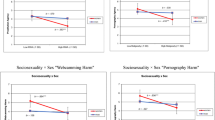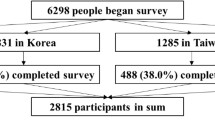Abstract
This study examined the relationship between internalized misogyny and two other forms of internalized sexism, self-objectification and passive acceptance of traditional gender roles. In addition, it examined the moderating role of internalized misogyny in the link between sexist events and psychological distress. Participants consisted of 274 heterosexual women who were recruited at a large southern university in the United States and completed an online survey. Results indicated that internalized misogyny was related to, but conceptually distinct from self-objectification and passive acceptance. Findings also indicated that greater experiences of sexist events were associated with higher levels of psychological distress. In addition, internalized misogyny intensified the relationship between external sexism and psychological distress.

Similar content being viewed by others
References
Aiken, L. S., & West, S. G. (1991). Multiple regression: Testing and interpreting interactions. Newbury Park, CA: Sage.
American Psychological Association. (2007). Guidelines for Psychological Practice with Girls and Women. American Psychologist, 62, 949–979.
Bargad, A., & Hyde, J. S. (1991). Women’s studies: A study of feminist identity development in women. Psychology of Women Quarterly, 15, 181–201.
Brown, L. S. (1994). Subversive dialogues. New York: Basic Books.
Buchanan, T., & Smith, J. L. (1999). Using the Internet for psychological research: Personality testing on the World Wide Web. British Journal of Psychology, 90, 125–144.
Burch, B. (1987). Barriers to intimacy: Conflicts over power, dependency, and nurturing in lesbian relationships. In Boston Lesbian Psychologies Collective (Ed.), Lesbian psychologies: Explorations and challenges, pp. 126–141. Chicago: University of Illinois Press.
Cohen, J., & Cohen, P. (1983). Applied multiple regression/correlation analysis for the behavioral sciences (2nd ed.). Hillsdale, NJ: Lawrence Erlbaum.
Corning, A. F. (2002). Self-esteem as a moderator between perceived discrimination and psychological distress among women. Journal of Counseling Psychology, 49, 117–126.
Cyr, J. J., McKenna-Foley, J. M., & Peacock, E. (1985). Facture structure of the SCL-90-R: Is there one? Journal of Personality Assessment, 49, 571–578.
Derogatis, L. R., Lipman, R. S., Rickets, K., Uhlenhuth, E. H., & Covi, L. (1974). The Hopkins Symptom Checklist (HSCL): A self-report symptom inventory. Behavioral Science, 19, 1–14.
Downing, N., & Roush, K. (1985). From passive acceptance to active commitment: A model of feminist identity development for women. The Counseling Psychologist, 13, 695–709.
Enns, C. Z. (2004). Feminist theories and feminist psychotherapies: Origins, themes, and Diversity (2nd ed.). New York: Haworth.
Fischer, A. R., & Holz, K. B. (2007). Perceived discrimination and women’s psychological distress: The roles of collective and personal self-esteem. Journal of Counseling Psychology, 54, 154–164.
Fischer, A. R., Tokar, D. M., Mergl, M. M., Good, G. E., Hill, M. S., & Blum, S. A. (2000). Assessing women’s feminist identity development: Studies of convergent, discriminant, and structural validity. Psychology of Women Quarterly, 24, 15–29.
Fitzgerald, L. F., Drasgow, F., Hulin, C. L., Gefand, M. J., & Magley, V. J. (1997). Antecedents and consequences of sexual harassment in organizations: A test of an integrated model. Journal of Applied Psychology, 82, 578–589.
Frazier, P. A., Tix, A. P., & Barron, K. E. (2004). Testing moderator and mediator effects in counseling psychology research. Journal of Counseling Psychology, 51, 115–134.
Fredrickson, B. L., & Roberts, T. (1997). Objectification theory: Toward understanding women’s lived experiences and mental health risks. Psychology of Women Quarterly, 21, 173–206.
Gosling, S. D., Vazire, S., Srivastava, S., & John, O. P. (2004). Should we trust web-based studies: A comparative analysis of six preconceptions about Internet questionnaires. American Psychologist, 59, 93–104.
Klonoff, E. A., & Landrine, H. (1995). The Schedule of Sexist Events: A measure of lifetime and recent sexist discrimination in women’s lives. Psychology of Women Quarterly, 19, 439–472.
Klonoff, E. A., Landrine, H., & Campbell, R. (2000). Sexist discrimination may account for well-known gender differences in psychiatric symptoms. Psychology of Women Quarterly, 24, 93–99.
Koss, M. P., Bailey, J. A., Yan, N. P., Herrera, V. M., & Lichter, E. L. (2003). Depression and PTSD in survivors of male violence: Research and training initiatives to facilitate recovery. Psychology of Women Quarterly, 27, 130–142.
Landrine, H., Klonoff, E. A., Gibbs, J., Masnning, V., & Lund, M. (1995). Physical and psychiatric correlates of gender discrimination: An application of the Schedule of Sexist Events. Psychology of Women Quarterly, 19, 473–492.
McKinley, N. M., & Hyde, J. S. (1996). The Objectified Body Consciousness Scale: Development and validation. Psychology of Women Quarterly, 20, 181–215.
Michalak, E. E., & Szabo, A. (1998). Guidelines for internet research: An update. European Psychologist, 3(1), 70–75.
Miner-Rubino, K., Twenge, J. M., & Fredrickson, B. L. (2002). Trait self-objectification in women: Affective and personality correlates. Journal of Research in Personality, 36, 147–172.
Moradi, B., & Funderburk, J. R. (2006). Roles of perceived sexist events and perceived social support in the mental health of women seeking counseling. Journal of Counseling Psychology, 53, 464–473.
Moradi, B., & Subich, L. M. (2002). Perceived sexist events and feminist identity development attitudes: Links to women’s psychological distress. The Counseling Psychologist, 30, 44–65.
Moradi, B., & Subich, L. M. (2003). A concomitant examination of the relations of perceived racist and sexist events to psychological distress for African American women. The Counseling Psychologist, 31(4), 451–469.
Moradi, B., & Subich, L. M. (2004). Examining the moderating role of self-esteem in the link between experiences of perceived sexist events and psychological distress. Journal of Counseling Psychology, 51, 50–56.
Moradi, B., Dirks, D., & Matteson, A. V. (2005). Roles of sexual objectification experiences and internalization of standards of beauty in eating disorder symptomatology: A test and extension of Objectification Theory. Journal of Counseling Psychology, 52, 420–428.
Muehlenkamp, J. J., & Saris-Baglama, R. N. (2002). Self-objectification and its psychological outcomes for college women. Psychology of Women Quarterly, 26, 371–379.
Myers, R. (1990). Classical and modern regression with application (2nd ed.). Boston: Duxbury.
Noll, S. M., & Fredrickson, B. L. (1998). A mediational model linking self-objectification, body shame, and disordered eating. Psychology of Women Quarterly, 22, 623–636.
O’Neil, J. (1981). Patterns of gender role conflict and strain: Sexism and fear of femininity in men’s lives. The Personnel and Guidance Journal, 60, 203–210.
Pavalko, E. K., Mossakowski, K. N., & Hamilton, V. J. (2003). Does perceived discrimination affect health? Longitudinal relationships between workplace discrimination and women’s physical and emotional health. Journal of Health and social Behavior, 43, 18–33.
Piggot, M. (2004). Double jeopardy: Lesbians and the legacy of multiple stigmatized identities. Psychology Strand at Swinburne University of Technology, Australia: Unpublished thesis.
Polusny, M. A., & Follette, V. M. (1995). Long-term correlates of child sexual abuse: Theory and review of the empirical literature. Applied and Preventive Psychology, 4, 143–166.
Saakvitne, K. W., & Pearlman, L. A. (1993). The impact of internalized misogyny and violence against women on feminine identity. In E. P. Cook (Ed.), Women, relationships, and power: Implications for counseling. Alexandria. VA: American Counseling Association.
Sabik, N. J., & Tylka, T. L. (2006). Do feminist identity styles moderate the relation between perceived sexist events and disordered eating? Psychology of Women Quarterly, 30, 77–84.
Schmidt, W. C. (1997). World-Wide Web survey research: Benefits, potential problems, and solutions. Behavior Research Methods, Instruments & Computers, 2, 274–279.
Snyder, R., & Hasbrouck, L. (1996). Feminist identity, gender traits, and symptoms of disturbed eating among college women. Psychology of Women Quarterly, 20, 593–598.
Swim, J. K., Cohen, L. L., & Hyers, L. L. (1998). Experiencing everyday prejudice and discrimination. In J. K. Swim & C. Stangor (Eds.), Prejudice: The target's perspective (pp. 37–60) San Diego. CA: Academic Press.
Swim, J. K., Hyers, L. L., Cohen, L. L., & Ferguson, M. J. (2001). Everyday sexism: Evidence for its incidence, nature, and psychological impact from three daily diary studies. Journal of Social Issues, 57, 31–53.
Szymanski, D. M. (2005). Heterosexism and sexism as correlates of psychological distress in lesbians. Journal of Counseling & Development, 83, 355–360.
Szymanski, D. M., & Henning, S. L. (2007). The role of self- objectification in women’s depression: A test of Objectification Theory. Sex Roles, 56, 45–53.
Szymanski, D. M., & Kashubeck-West, S. (2008). Mediators of the relationship between internalized oppressions and lesbian and bisexual women’s psychological distress The Counseling Psychologist, 36, 575–594.
Szymanski, D. M., & Owens, G. P. (2009). Group level coping as a moderator between heterosexism and sexism and psychological distress in sexual minority women. Psychology of Women Quarterly, 33, 197–205.
Tabachnick, B. G., & Fidell, L. S. (2001). Using multivariate statistics (4th ed.). Needham Heights, MA: Allyn & Bacon.
Tiggemann, M., & Kuring, J. K. (2004). The role of body objectification in disordered eating and depressed mood. British Journal of Clinical Psychology, 43, 299–311.
Tiggemann, M., & Slater, A. (2001). A test of objectification theory in former dancers and non- dancers. Psychology of Women Quarterly, 25, 57–64.
Wolfe, J., & Kimerling, R. (1997). Gender issues in the assessment of posttraumatic stress disorder. In J. P. Wilson & T. M. Keane (Eds.), Assessing psychological trauma and PTSD, pp. 192–238. New York: Guilford.
Worell, J., & Remer, P. (2003). Feminist perspectives in therapy: Empowering diverse women (2nd ed.). Hoboken, NJ: Wiley.
Worell, J., Stilwell, D., Oakley, D., & Robinson, D. (1999). Educating about women and gender: Cognitive, personal, and professional outcomes. Psychology of Women Quarterly, 23, 797–811.
Zucker, A. N., & Landry, L. J. (2007). Embodied discrimination: The relation of sexism and distress to women’s drinking and smoking behaviors. Sex Roles, 56, 193–203.
Author information
Authors and Affiliations
Corresponding author
Rights and permissions
About this article
Cite this article
Szymanski, D.M., Gupta, A., Carr, E.R. et al. Internalized Misogyny as a Moderator of the Link between Sexist Events and Women’s Psychological Distress. Sex Roles 61, 101–109 (2009). https://doi.org/10.1007/s11199-009-9611-y
Received:
Accepted:
Published:
Issue Date:
DOI: https://doi.org/10.1007/s11199-009-9611-y




